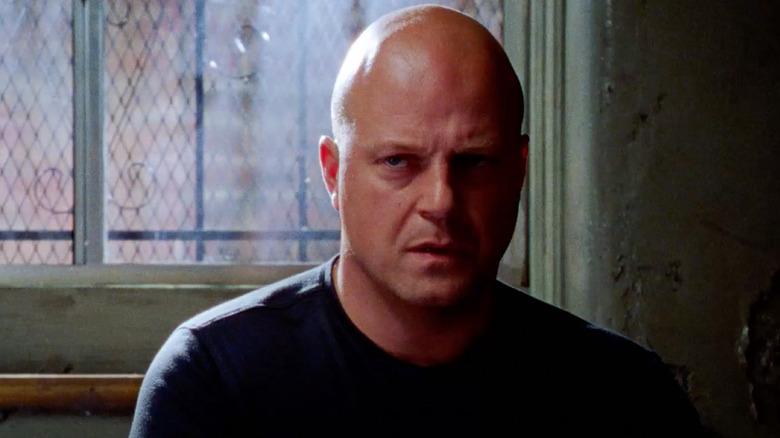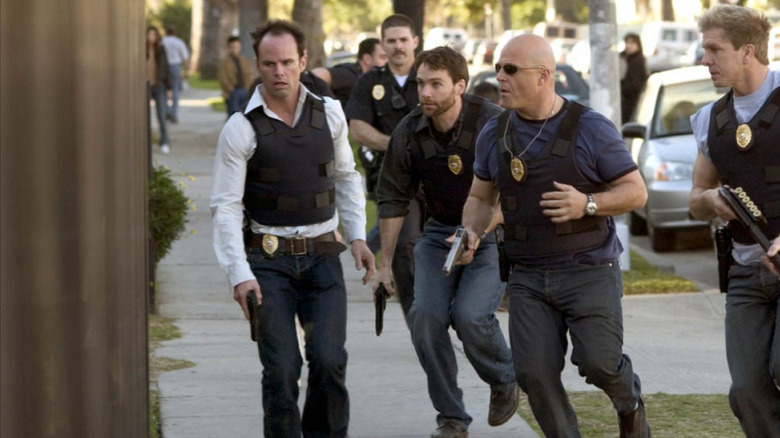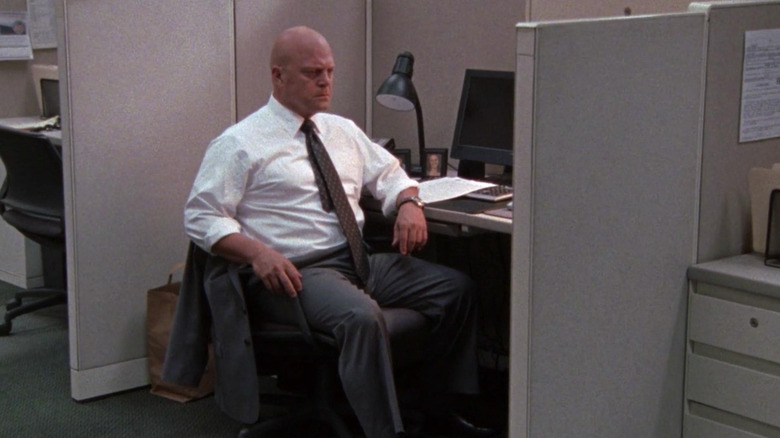FX's The Shield Was Inspired By An Actual LAPD Crime Unit (But Couldn't Reference Them)
When it comes to police procedurals, "The Shield" is undeniably the most brutal of them all. While its depiction of modern policing isn't that dissimilar to contemporaries such as "The Wire," the FX series was known for its strict moral ambiguity in how its central police unit got its jobs done. As much as it wanted you to know the tribulations of its crew, including detective Vic Mackey (Michael Chiklis), it also purposefully made viewers conflicted with each revelation and dirty trick they passed off as for the greater good. How can viewers possibly root for these guys if they're brutalizing and framing whomever they deem suspicious enough to investigate? The show aired during the early 2000s rise of the anti-hero "protagonist," and Mackey's corrupt ways certainly made him stand out.
However, for many in Los Angeles, the crimes depicted throughout "The Shield" were all too familiar, and that was by design. Longtime writer and producer on the show Glen Mazzara revealed as much in a 2020 Twitter thread, written amid the nationwide protests against the murder of George Floyd by an on-duty officer. He said the show was conceived as a send-up of the Los Angeles Police Department and its Community Resources Against Street Hoodlums unit. If you recall, that unit, called CRASH, was involved in several cases of police corruption that specifically targeted L.A.'s Black and brown communities. The parallels were so apparent that the real-life LAPD allegedly tried retaliating against the production in their own ways.
Crossing the wrong paths
According to Glen Mazzara, the FX show was initially called "Rampart," an overt reference to the Rampart scandal that embroiled CRASH in the late 1990s. Considering that it was a police procedural announced in the early 2000s set in L.A., there was no denying the influence CRASH and their legacy had on the show. The original name was later used for an unrelated 2012 film on the Rampart scandal. Mazzara said that shortly after the show was announced, the LAPD threatened to sue the show unless they changed the title and removed all references to them.
"Watch the show closely," wrote Mazzara. "We never say 'LAPD.' Our characters say, 'police' or 'PD' or 'Farmington' but never 'LAPD.'"
Furthermore, "The Shield" was barred from using LAPD badges in the show itself, as those were allegedly protected by copyright. While the show did comply with these demands, likely out of fear of legal issues, the LAPD wasn't entirely done with them yet. "The Shield" was filmed on location in Los Angeles, and it is standard protocol for local police units to provide security on any type of major production set. However, Mazzara recalled the LAPD refusing to provide personnel for when the show did street shoots, writing:
"I also believe LAPD would not provide standard protection or traffic control when we were out on the street shooting our show. I could be wrong about that but I vaguely remember that."
A different (and worse) kind of cop
The fact that the LAPD seemingly had a ton of demands put onto "The Shield" in order for it to even film does strangely harken back to its own CRASH antics. According to University of Southern California law professor Erwin Chemerinsky, CRASH's transgressions were a result of their officers "planting evidence and committing perjury to gain convictions" of innocent civilians whom they framed for gang activity. The unit was also involved in inner-department shootings, bank robberies, and excessive force investigations that had their members' involvement covered up through perjury and intimidation (via Frontline). To this day, the LAPD still is chasing the ghosts of its CRASH past, and according to Police Score Card, they are still involved in more police shootings per arrest than 81% of other police units in the United States.
In the Twitter thread, Glen Mazzara referred to the behavior by the LAPD as "bullying," and if his word is true, then it's easy to see why. From a viewer's perspective, "The Shield" did not appear to be slanderous in any way, although that could have been changed to avoid legal action with the department. Regardless, it feels wrong that a police department would try to go as far as they allegedly did to prevent a show from being made. Shouldn't art, even if you interpret one particular piece as a slight against you, be allowed to be made without restriction? And if that art centers around police units, should they be portrayed in a flattering light to avoid criticism? Mazzara certainly doesn't think so:
"Writers should take a good, hard look around and write the s*** out of what's going on. Hold up that mirror, no matter how ugly the truth may be. That's your f***ing job."


